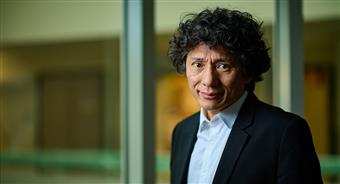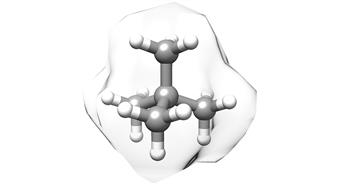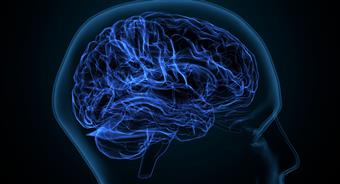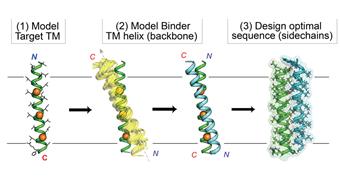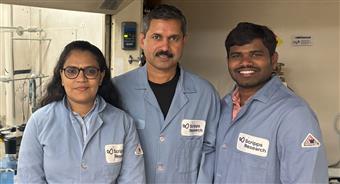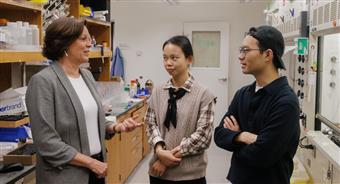
Scientists find human antibodies that can block multiple coronaviruses including SARS-CoV-2 Results from a Scripps Research and UNC team pave the way for a vaccine and therapeutic antibodies that could be stockpiled to fight future coronavirus pandemics.
March 01, 2023
LA JOLLA, CA A team of scientists from Scripps Research and the University of North Carolina (UNC) has found antibodies in the blood of certain COVID-19 donors that can block infection from a broad set of coronaviruses specifically, in people who have recovered from the virus and were then vaccinated. They found this includes not only the COVID-19-causing SARS-CoV-2, but also SARS-CoV-1 and MERS-CoV.
The scientists' detailed study of the antibodies and their virus binding sites, reported on February 15, 2023, in the journal Immunity, could lead to the development of a broad coronavirus vaccine and related antibody therapeutics. Both could be used against future coronavirus pandemics as well as any future variants of SARS-CoV-2.
We show here that there are individual human monoclonal antibodies that can be found that protect against all three recent deadly coronaviruses: SARS-CoV-1, SARS-CoV-2 and MERS-CoV, says study co-senior author Raiees Andrabi, PhD, institute investigator in the Department of Immunology and Microbiology at Scripps Research.
The other Scripps Research co-senior authors were Dennis Burton, PhD, professor and James and Jessie Minor Chair of the Department of Immunology and Microbiology, and Ian Wilson, PhD, Hansen Professor of Structural Biology and chair of the Department of Integrative Structural and Computational Biology. The co-senior authors from UNC were professor Ralph Baric, PhD, and assistant professor Lisa Gralinski, PhD.
SARS-CoV-2, along with SARS-CoV-1 (the cause of the 2002-04 SARS outbreak) and MERS-CoV (the cause of deadly Middle East Respiratory Syndrome), belong to a broad grouping of coronaviruses known as betacoronaviruses. These viruses mutate at a modestly high rate, creating a significant challenge for the development of vaccines and antibody therapies against them. Thus, in the case of SARS-CoV-2, although existing vaccines have been very helpful in limiting the toll of disease and death from the pandemic, new SARS-CoV-2 variants have emerged that can spread even among vaccine recipients.
Over the past two years, however, the Andrabi/Burton and Wilson laboratories have been finding evidence that SARS-CoV-2 and other betacoronaviruses have a vulnerable site that does not mutate much. This site, which is in the S2 region (or base) of the viral spike protein, is relatively conserved on betacoronaviruses that infect a variety of animal species. By contrast, current SARS-CoV-2 vaccines mainly target the viral spike protein's relatively mutable S1 region, with which the virus binds to host-cell receptors.
The S2 site plays a key role in how betacoronaviruses progress from receptor-binding to the membrane fusion that enables entry into host cells in the respiratory tract. In a study reported last year, the Andrabi/Burton and Wilson laboratories found that some human antibodies can bind to this site on SARS-CoV-2 in a way that apparently disrupts viral fusion and blocks infection. The existence of such a vulnerable site raises the possibility of targeting it to provide both long-lasting and broad protection against betacoronaviruses. Therefore, the researchers, for the new study, made a more comprehensive search for anti-S2 antibodies in blood samples from human volunteers.
These volunteers were individuals who had recovered from COVID-19, had been vaccinated, or had recovered from COVID-19 and then had been vaccinated. Somewhat to the researchers' surprise, they found that antibodies to the vulnerable S2 site were present in the vast majority of volunteers in the latter group people who had recovered from COVID-19 and then had been vaccinated but at a much lower frequency in the others. Overall, the researchers identified and characterized 32 of these S2-targeting antibodies.
In lab virus neutralization studies and in virus-challenge studies with mice at UNC, the researchers found that several of these antibodies provide protection of unprecedented breadth not only against SARS-CoV-2 but also SARS-CoV-1 and MERS-CoV betacoronaviruses.
In principle, a vaccination strategy that can induce such antibodies is likely to provide broad protection against a diverse spectrum of betacoronaviruses, says Burton.
Structural studies of several of the antibodies when bound to S2 illuminated their common binding sites and modes of binding, providing key information that should aid the development of future vaccines targeting this region.
Targeted rational vaccine strategies could take advantage of this molecular information of the interactions of these antibodies with the S2 domain to inform the design of pan-betacoronavirus vaccines says Wilson.
Indeed, the researchers have already applied their findings to the initial design and testing of a potential pan-betacoronavirus vaccine candidate, which if successful could be stockpiled to limit future pandemics. The investigators also envision a therapeutic mix of different S2-targeting antibodies, perhaps as a cocktail with antibodies to other spike regions, that could be taken to prevent infection by a novel betacoronavirus or to reduce disease in those already infected.
Broadly neutralizing anti-S2 antibodies protect against all three human betacoronaviruses that cause deadly disease was co-authored by Panpan Zhou, Ge Song, Hejun Liu, Meng Yuan, Wan-ting He, Nathan Beutler, Xueyong Zhu, Longping Tse, David Martinez, Alexandra Sch fer, Fabio Anzanello, Peter Yong, Linghang Peng, Katharina Dueker, Rami Musharrafieh, Sean Callaghan, Tazio Capozzola, Oliver Limbo, Mara Parren, Elijah Garcia, Stephen Rawlings, Davey Smith,
More from Scripps
20/04/2024
New copper-catalyzed C-H activation strategy from Scripps Research Two-mode reactions inspired by human detox enzymes offer powerful new tools for drug discover...
12/04/2024
Scripps Research chemists devise easier new method for making a common type of building block for drugs Scientists transform simple linear amines into saturated...
06/04/2024
A simple, inexpensive way to make carbon atoms bind together A Scripps Research team uncovers a cost-effective method for producing quaternary carbon molecules,...
04/04/2024
Developing a vaccine for the zombie drug xylazine Scripps Research chemical biologists design an early proof-of-concept vaccine that could lead to the first...
30/03/2024
How blocking a neural receptor responsible for addiction could reduce alcohol use A Scripps Research team found that a new therapeutic that targets the kappa op...
13/03/2024
New computational strategy boosts the ability of drug designers to target proteins inside the membrane Customized-design approach could streamline the design of...
29/02/2024
Scripps Research scientists reveal how first cells could have formed on Earth New phospholipid discovery brings researchers closer to understanding how primordi...
29/02/2024
How molecular handedness emerged in early biology Scripps Research chemists fill a major gap in origin-of-life theories.
February 28, 2024
LA JOLLA, CA Mole...
22/02/2024
Snaking toward a universal antivenom Scripps Research scientists discovered antibodies that protect against a host of lethal snake venoms.
February 21, 2024
...
06/02/2024
Calibr-Skaggs announces expansion of option and license agreement with AbbVie to develop novel cell therapies for solid tumors and autoimmune diseases
AbbVie...
26/01/2024
Re-energizing mitochondria to treat Alzheimer's disease Scripps Research team restored neuron-to-neuron connections in human cells.
January 25, 2024
LA JO...
24/01/2024
100 years of Science Changing Life: Scripps Research celebrates a century of transforming human health For the last century, institute leaders and renowned scie...
23/01/2024
New technology lets researchers track brain cells' off switches The method could shed light on what goes awry in numerous brain conditions when neurons ar...
09/01/2024
Three decades of giving: Announcing the Calibr-Skaggs Institute for Innovative Medicines The ALSAM Foundation, founded by the Skaggs family, provides lasting g...
04/01/2024
Life science entrepreneur Gene Lay joins Scripps Research Board of Directors Lay, founder of the global biotech company BioLegend, brings invaluable experience ...
21/12/2023
Taming a plant-derived toxin Scripps Research team modifies the traditional poison picrotoxinin for potential neurological drugs and anti-parasite treatments. ...
19/12/2023
Scripps Research Executive Vice President Eric Topol gives TED talk on transformative power of AI in medicine Topol provides an overview of how AI models can i...
13/12/2023
New AI-powered algorithm could better assess people's risk of common heart condition Early detection of atrial fibrillation can reduce the risk of stroke an...
07/12/2023
Nanoparticle flu vaccine design shows promise in early tests Scripps Research-designed vaccine could provide broad, enduring protection against influenza A str...
16/11/2023
Numerous Scripps Research scientists named Highly Cited Researchers Clarivate's annual, global list represents researchers who have demonstrated significant...
07/11/2023
Multiple sclerosis drug invented at Scripps Research slows long-term devastating disease progression Late-breaking data reinforces the effectiveness and safety ...
05/10/2023
Keren Lasker named a 2023 Moore Inventor Fellow The prestigious award will support Lasker's inventive research in membraneless organelles and their applica...
22/09/2023
Michael Bollong named a 2023 Amgen Young Investigator The prestigious award will support Bollong's research identifying new molecular targets and therapeuti...
09/09/2023
Philip Dawson receives 2024 American Chemical Society National Award Dawson is honored with the Arthur C. Cope Late Careers Scholar Award for his foundational c...
07/09/2023
Scripps Research chemists devise a method for C-H activation of alcohols The method represents a new toolkit for making drugs and other compounds.
September 06...
31/08/2023
Scripps Research receives $1.5M to surveil infectious disease threats in wastewater Bill & Melinda Gates Foundation award to support the development of multi-pa...
16/08/2023
How cold temperatures trigger the brain to boost appetite Scripps Research scientists' discovery could lead to new weight loss and metabolic health treatmen...
08/08/2023
Human antibody that targets carfentanil, fentanyl and related opioids reverses overdose effects in preclinical study Scripps Research-developed antibody therapy...
04/08/2023
How sensory neurons impact the gut Scripps Research scientists show that the receptor PIEZO2 in sensory neurons controls gut motility and transit time, which a...
26/07/2023
AbbVie and Calibr Expand Strategic Collaboration to Advance Several Preclinical and Early-stage Clinical Assets The expanded strategic collaboration will advan...
23/07/2023
Scripps Research scientists develop AI-based tracking and early-warning system for viral pandemics Machine-learning system effectively predicts emergence of pro...
19/07/2023
Monitoring T cells may allow prevention of type 1 diabetes Scripps Research study shows that analyzing T cells in blood samples could be used to select at-risk ...
19/07/2023
Scripps Research mourns passing of leading organic chemist Albert Eschenmoser Eschenmoser pioneered key reactions in synthetic chemistry and shaped the understa...
15/06/2023
Scripps Research awarded $46.8 million by NIH to promote human health through innovative translational science and training The Translational Institute is harne...
13/06/2023
Scripps Research's Danielle Grotjahn named 2023 Pew Scholar in the Biomedical Sciences The award will support Grotjahn's study of how cells assemble the...
31/05/2023
Crossing the ring: new method enables C-H activation across saturated carbocycles Scripps Research chemists add another powerful tool to their molecular editin...
24/05/2023
Scripps Research develops behind-the-scenes tool for better biomedical data discovery The new resource makes datasets more discoverable for life science communi...
19/05/2023
Scripps Research neuroscientist Hollis Cline elected to American Academy of Arts and Sciences Cline is recognized for her discoveries about the role of sensory ...
19/05/2023
Scripps Research's Skaggs Graduate School awards doctoral degrees to 31st graduating class Commencement ceremony will be livestreamed via Zoom and on instit...
13/05/2023
A better route to benzocyclobutenes, sought-after building blocks for drugs Scripps Research chemists devise a new, C-H activation-based method for the synthesi...
09/05/2023
Renowned Scripps Research professor Jeffery Kelly elected to National Academy of Sciences Kelly's groundbreaking work on protein misfolding has led to thera...
28/04/2023
Mirror-image molecules pave new path for cancer drug discovery By comparing how mirror image versions of small molecules impact clusters of proteins, Scripps R...
22/04/2023
How alcohol consumption contributes to chronic pain A Scripps Research team showed how both alcohol intake and alcohol withdrawal can lead to increased pain and...
21/04/2023
Xin Jin receives dual awards to study autism risk genes in neurodevelopment Major grants from the National Institutes of Health and California Institute for Reg...
20/04/2023
Trim the sugar: New HIV vaccine design improves immune response Scripps Research vaccine candidate headed for clinical trials.
April 19, 2023
LA JOLLA, CA A...
18/04/2023
Therapeutic can seek and destroy potent opioid to treat overdoses Scripps Research chemists developed a new biologic to work against the synthetic opioid carfen...
07/03/2023
How heavy alcohol consumption increases brain inflammation The findings by a Scripps Research team point toward a potential new drug target for treating alcohol...
02/03/2023
Scientists find human antibodies that can block multiple coronaviruses including SARS-CoV-2 Results from a Scripps Research and UNC team pave the way for a vacc...
28/02/2023
$10 million grant funds Scripps Research Alcohol Research Center through its 50th year The five-year grant supports research into the neurobiology of alcohol us...
28/02/2023
Immune system drug shows promise in treating alcohol use disorder, a Scripps Research clinical trial reports Scientists at Scripps Research found that apremilas...
 Scientists find human antibodies that can block multiple coronaviruses including SARS-CoV-2 Results from a Scripps Research and UNC team pave the way for a vaccine and therapeutic antibodies that could be stockpiled to fight future coronavirus pandemics.
Scientists find human antibodies that can block multiple coronaviruses including SARS-CoV-2 Results from a Scripps Research and UNC team pave the way for a vaccine and therapeutic antibodies that could be stockpiled to fight future coronavirus pandemics.














